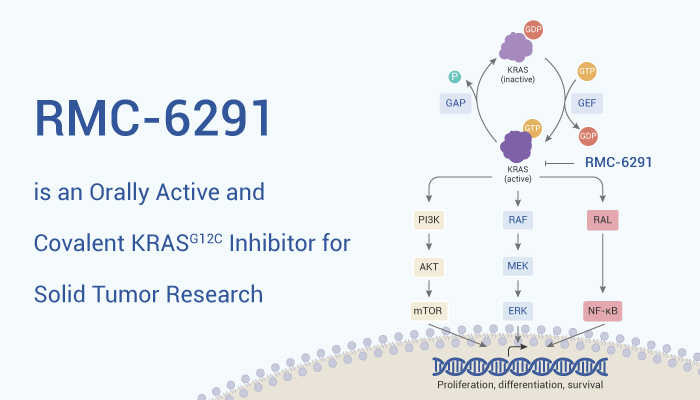KRAS plays a critical role in regulating cell growth and division. KRAS mutations are common in many types of solid tumors, including lung, colon, and pancreatic cancers, and are associated with poor prognosis and limited treatment options.
RMC-6291 is an orally active and covalent inhibitor of KRASG12C (ON). This inhibitor forms a tri-complex within tumor cells between KRASG12C(ON) and cyclophilin A (CypA). Thus, RMC-6291 prevents KRASG12C (ON) from signaling via steric blockade of RAS effector binding. Additionally, RMC-6291 elicits deep and durable suppression of RAS pathway activity in KRASG12C tumor models.
Preclinical studies of RMC-6291 have shown promising results in animal models consisting of multiple patients- and cell-line-derived xenograft models of KRASG12C NSCLC,
Additionally, In a mouse clinical trial, RMC-6291 outperformed Adagrasib. It exhibits increasing the number of responses, the depth of tumor regressions, and the durability of responses.
What is more, Combination treatment with RMC-6291 and SHP2 or SOS1 inhibitors showed well-tolerance in preclinical models. As a result, the combination also shows increased anti-tumor activity. This is likely to prevent the reactivation of wild-type RAS proteins that cooperate with KRASG12C to fuel cancer growth. Besides, RMC-6291 also combines well with immune checkpoint inhibitors. It sensitizes KRASG12C-bearing cancer models to anti-tumor immunity!
All in all, RMC-6291 is a next-generation, mutant-selective inhibitor of KRASG12C(ON).

It overcomes the limitations of first-generation KRASG12C(OFF) inhibitors. In a phase 1 trial presented at the American Association for Cancer Research (AACR) Annual Meeting, RMC-6291 demonstrated promising activity in patients with non-small cell lung cancer (NSCLC) and other solid tumors with KRAS G12C mutations. The drug was well-tolerated and showed encouraging anti-tumor activity.
In conclusion, The development of targeted therapies like RMC-6291 represents a significant advancement in the treatment of KRAS mutant cancer. Besides, it has historically been challenging to treat. Researchers are hopeful that this drug and others like it may provide new treatment options for patients with KRAS mutant solid tumors.
Reference:
[1] Nichols R J, et al. Cancer Research, 2022, 82(12_Supplement): 3595-3595.